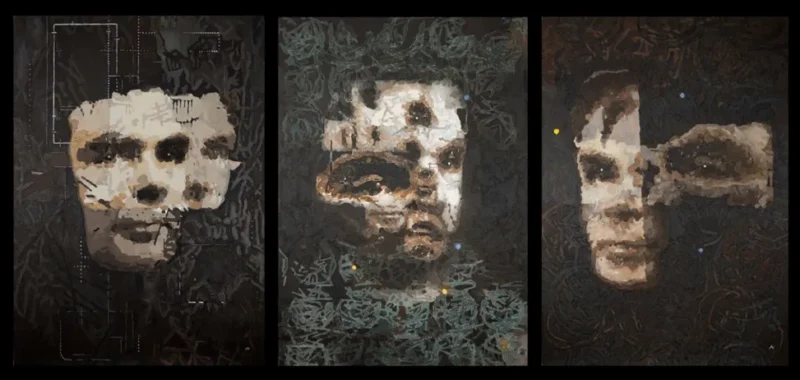Auction house Sotheby’s begins taking bids this week on the first artwork created by a humanoid robot. The portrait of computer science pioneer Alan Turing, titled “A.I. God,” was created by Ai-Da, an ultra-realistic robot artist equipped with AI algorithms and mechanical arms.
The 7.5-foot-tall portrait, which will be offered in Sotheby’s Digital Art Sale from October 31 to November 7, is expected to fetch between $120,000-$180,000. The piece features haunting imagery with muted tones and broken facial planes, set against a background depicting shadowy forms of the Bombe machine, Turing’s revolutionary code-breaking device.
Michael Bouhanna, Sotheby’s Head of Digital Art, spoke with Decrypt about the strategic timing behind this historic auction. “The combination of art and technology is gaining more interest,” he said, “particularly among a younger generation of collectors.”
Why sell now? There’s growing interest among collectors. “After extensive conversations with prominent collectors at the intersection of art and technology, it quickly became clear that demand for this piece is strong,” Bouhanna added.
Bouhanna notes that Ai-Da’s works have been on his radar for some time, after he visited the robot’s studio. Ai-Da has been working from Studio 5 at Porthmeor Studios in St. Ives in the UK since 2021.
“It felt too early back then to bring these types of works to market,” he said, “but the past two years have been instrumental in the growing interest in AI art.”
Sotheby’s has so far generated more than $200 million in sales with its newly created Digital Art Department, which launched in 2021.
Luba Elliott, a curator specializing in artificial intelligence in creative industries, told Decrypt there have been several auctions over the years for historical and contemporary artificial intelligence art, including the Christie’s 2018 sale of Obvious’ Edmond de Bellamy, an AI-generated portrait in a golden frame and Sotheby’s auction of Mario Klingemann’s Memory of Passerby.”
But this one is unique, she said. “Ai-Da robot is a humanoid robot, which is more of an unusual approach in the field and will help to further broaden the definition of AI art,” Elliott added.
Speaking about the artwork, Ai-Da herself said in a press release: “Through my artwork of Alan Turing, I commemorate his achievements and contributions to the development of computing and A.I. My artwork aligns with the United Nations ethos that A.I. is used responsibly – something Alan Turing also advocated.”
Aidan Meller, Director of the Ai-Da Robot Studio, explained the deeper significance. “In the 1950’s, Alan Turing raised concerns over the use of AI. Ai-Da’s portrait hauntingly evokes Alan Turing, and the artwork seemingly suggests the struggles Turing warned we will face when it comes to managing AI,” he said.
The auction, featuring works alongside prominent digital artists like Xcopy, Pak, and Refik Anadol, signals a maturing market for AI-created art.
Yet, as Elliott emphasizes, the significance lies not just in the sale itself, but in how it “helps to further broaden the definition of AI art” and pushes the boundaries of what we consider creative expression in the digital age.
Edited by Stacy Elliott.

